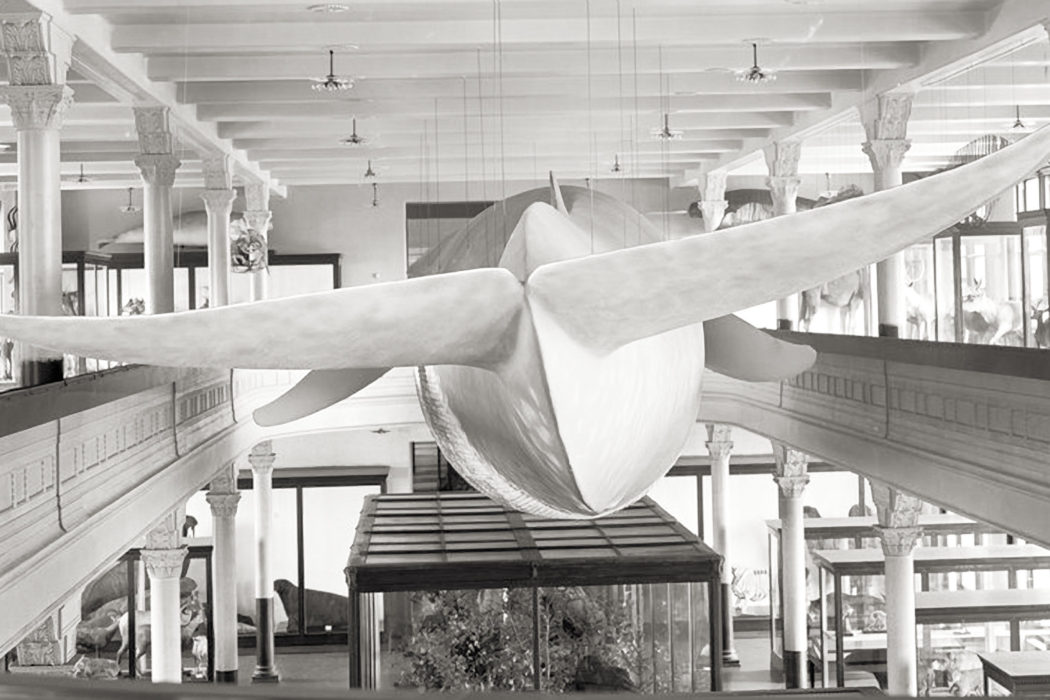THE BELLY OF THE blue whale was lined with deep corrugations, like a field that had just been plowed. It hung from the ceiling of the Mammal Gallery in the American Natural History Museum in New York, which ‘Abdu’l-Bahá visited on July 9, 1912.
It was seventy-six feet long and weighed four tons. It wasn’t a real blue whale but a model of one, the largest in the country. It had taken eight months to build in 1907; its skin was papier-mâché.
The sight of the whale made ‘Abdu’l-Bahá laugh. “He could hold seventy Jonahs!” he declared.
The walk to the museum from ‘Abdu’l-Bahá’s house, at 309 West 78th Street, had taken about twenty-five minutes. But the heat that day was oppressive, and he sat down on a stone ledge to rest before traversing the last half block to the museum’s main door. Juliet Thompson, who accompanied him, looked for a closer entrance. She tried the employee entrance, but it was locked. Then a shrill whistle stopped her in her tracks.
She turned around to face an old, bent little man with a kind face. He was the watchman of the museum grounds, and he was Jewish. She pointed to ‘Abdu’l-Bahá: “I must find a nearer door than the main one. See Who is sitting on that ledge! I must find it for Him.” The watchman turned and looked at ‘Abdu’l-Bahá.
“Is he a Jew?” he asked.
“A descendant of Abraham.”
“Ask Him to come to me,” the watchman said.
‘Abdu’l-Bahá, Juliet Thompson, and the Persian attendants followed the watchman, who showed them a shortcut across the grass. After seeing the blue whale and viewing a few more exhibits, ‘Abdu’l-Bahá walked outside and sat on the grass under the shade of a birch tree.
The watchman stole up beside Juliet. “Who is He?” he asked. “He looks like such a great man.”
“He is ‘Abdu’l-Bahá of Persia,” she replied, “and He has been a great Sufferer because of His work for the real Brotherhood of Man, the uniting of all the races and nations.”

“I should like to speak to Him,” the watchman said. As he approached, ‘Abdu’l-Bahá called him to sit down on the grass. “Thank You, Sir, but I am not allowed,” he answered.
‘Abdu’l-Bahá asked if it was against the museum rules to sit on the grass.
“No, You may sit there all day,” the watchman replied, his eyes fixed upon ‘Abdu’l-Bahá. But ‘Abdu’l-Bahá stood up and stood next to the tree, his white robe catching the sunlight. “You didn’t see the whole of the Museum,” the man continued. “Would You like to go back after You have rested? You didn’t go up to the third floor. The fossils and the birds are up there. Wouldn’t You like to see the birds?”
“I am tired of travelling and looking at the things of this world,” ‘Abdu’l-Bahá responded, his voice gentle, “I want to go above and travel and see in the spiritual worlds. What do you think about that?”
The watchman remained silent and scratched his head.
“Which would you rather possess,” ‘Abdu’l-Bahá asked him, “the material or the spiritual world?”
The old Jewish man thought about it. “Well, I guess the material world,” he said, finally. “You know you have that, anyway.”
“But you do not lose it when you have attained the spiritual world,” ‘Abdu’l-Bahá responded. “When you go upstairs in a house, you don’t leave the house. The lower floor is under you.”
“Oh I see!” the watchman cried, his face lighting up. “I see!”
When she returned to the museum the following week in order to invite the watchman to ‘Abdu’l-Bahá’s house, Juliet Thompson found a young watchman in his place, who knew nothing of the old Jewish man. She never found out what happened to him, but in her diary she wondered if he had, perhaps, died.






